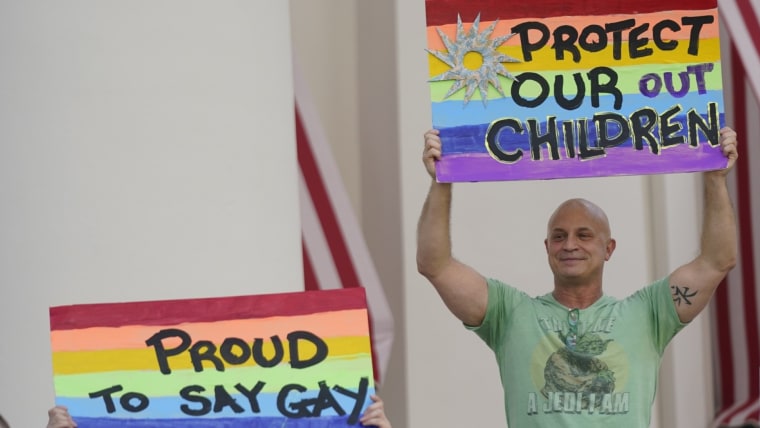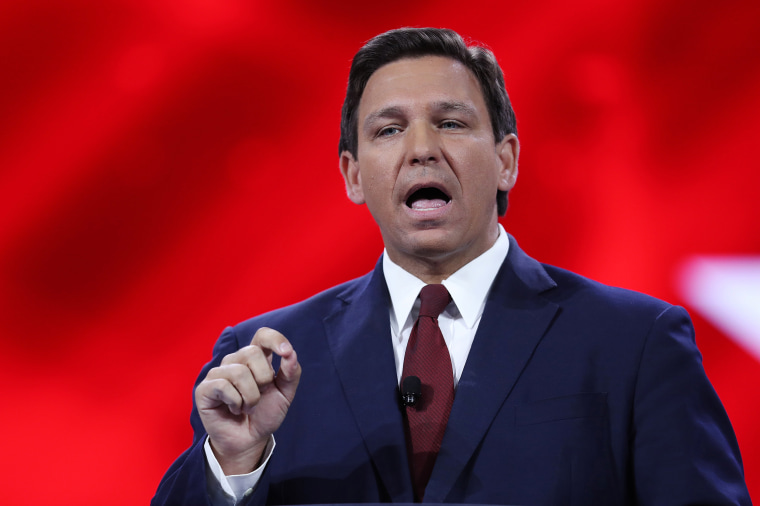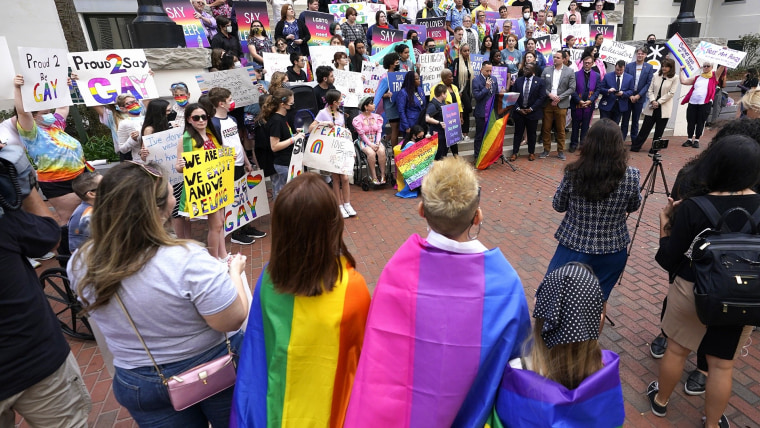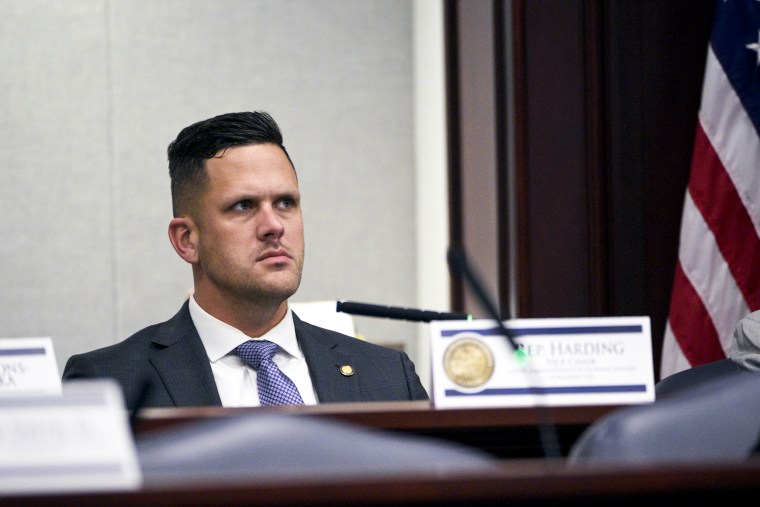Here’s what Florida’s ‘Don’t Say Gay’ bill would do, and what it wouldn’t do
Debate over state legislation that affects the LGBTQ community rarely leaves the halls of state capitols. But Florida’s Parental Rights in Education act — which critics have dubbed the “Don’t Say Gay” bill — has suddenly sparked a national war of words.
In recent weeks, leaders of global corporations, editorial boards of major newspapers and Hollywood actors have all weighed in on the proposed legislation, with some calling it “deeply disturbing” and others “noncontroversial.” Kate McKinnon ripped into the bill during a recent “Weekend Update” segment on NBC’s “Saturday Night Live.” The hosts of the ABC talk show “The View” mulled over the policy for more than seven minutes on air last month. And Bravo’s Andy Cohen dedicated a closing segment of “Watch What Happens Live” last week to slam the measure.

How Florida’s ‘Don’t Say Gay’ bill could impact members of the LGBTQ community
The bill has even prompted President Joe Biden — who has seldom weighed in on the recent slate of state bills concerning LGBTQ people — to use the bully pulpit of the White House to rebuke the Florida measure and its sponsors. The bill even appears to have caused a rift between Florida Gov. Ron DeSantis, who has said he supports the bill but hasn’t signed it yet, and Disney CEO Bob Chapek.
Supporters of HB 1557 say it would give parents greater control over their children’s education, vindicating their “parental authority.” Conversely, opponents say it would unfairly target the LGBTQ community — particularly gay and trans students — and is “pretending to solve a problem that doesn’t exist.”
So, which is it?
For starters, criticism that the “Don’t Say Gay” bill does not in fact say “gay” anywhere in its text is true. The bill, which passedFlorida’s Senate last week and the state’s House of Representatives in February, does, however, contain the terms “sexual orientation” and “gender identity,” each twice.
But legal experts say that whether the bill prohibits the word “gay” itself is a “distraction.”
“In the same way that critical race theory isn’t being taught in schools, that hasn’t stopped people like the governor of Florida from deploying the term ‘critical race theory’ in efforts to engage in certain kinds of political maneuverings,” said Charlton Copeland, a professor at the University of Miami School of Law who writes about sexual orientation and gender identity. “The ‘Don’t Say Gay’ moniker is a moniker about a certain political framing of this situation.”https://iframe.nbcnews.com/OGojlsF?_showcaption=true
Beyond branding, a core argument over the bill centers around whether it would prohibit the “instruction” or “discussion” of sexual orientation.
The bill’s sponsors have emphatically stated that the bill would not prohibit students from talking about their LGBTQ families or bar classroom discussions about LGBTQ history, including events like the 2016 deadly attack on the Pulse nightclub, a gay club in Orlando. Instead, they argue that the bill would bar the “instruction” of sexual orientation or gender identity.
But the text says both.
In its preamble, the bill’s authors write that their aim is to prohibit “classroom discussion about sexual orientation or gender identity.” But later, the actual bill states that “classroom instruction by school personnel or third parties on sexual orientation or gender identity may not occur.”
Get the Evening Rundown
A rundown of the day’s top stories and headlines.SIGN UPTHIS SITE IS PROTECTED BY RECAPTCHA PRIVACY POLICY | TERMS OF SERVICE
“I could see why people are confused by that,” said Clay Calvert, a professor at the University of Florida Levin College of Law who specializes in freedom of speech.
“I have no idea why that’s still left up there, but that’s not part of the binding legislation that DeSantis would sign,” Calvert added, referring to the word “discussion” in the bill’s preamble.

“Basically, all of that language is just telling us what the bill is about,” Calvert said, contending that the text in the bill’s preamble would have no real-life consequences.
Copeland disagreed.
“One of the things I would have told my students in the fall, when I taught them statutory interpretation, and one of the things that courts certainly do, is to look at the preamble to assess, ‘Well, what’s the scope of that term called ‘instruction?’” Copeland said. “And the preamble seems to have a conception of what is prohibited that is much broader when we might think of a cramped conception of ‘instruction.’”
He added, “A good lawyer in a local school district, a good lawyer in the state department of education is going to do exactly that.”
Regardless, it remains unclear what the “instruction” of sexual orientation or gender identity entails. A definition of that type of lesson is not in the bill’s text.

Without a clearer description, Calvert said, “teachers may legitimately fear being sued” for a wide variety of classroom instruction, including lessons concerning same-sex marriage or the history of the AIDS epidemic.
OUT NEWSOklahoma university allegedly fires professor over gay guest speaker
“If a student raises a question that is not part of the lesson plan or the instructional plan of a teacher, but that question ties to sexual orientation or gender identity, then what may the teacher say at that point?” Calvert said.
Calvert raised the prospect of answering a student’s question about how same-sex couples marry each other.
“Am I teaching about what the Constitution says in that case, or am I teaching about sexual orientation?” he asked.
The bill’s sponsors did not directly answer repeated queries to provide examples of “instruction” of sexual orientation or gender identity during House and Senate debate. When asked by a Democratic lawmaker to explain what the instruction of sexual orientation or gender identity would look like, Republican state Rep. Joe Harding, one of the bill’s sponsors, read the definition of the word “instruction” from what appeared to be a dictionary.

“Vagueness is deployed for certain purposes. People aren’t vague just because they’re ignorant; they’re not vague because they’re sloppy; they’re not vague because they’re lazy,” Copeland said. “Sometimes they’re intentionally vague to move the site of where the political fight is going to take place.”
Which age groups the bill would apply to has also sparked fierce debate in recent weeks.
The text states that teachings on sexual orientation or gender identity would be banned “in kindergarten through grade 3 or in a manner that is not age appropriate or developmentally appropriate for students in accordance with state standards.”
Critics have said the language of this provision could open districts and educators to lawsuits from parents who believe any conversation about LGBTQ people or issues to be inappropriate, regardless of their child’s age.
Legal experts agree, but dispute that a parent’s interpretation of what is or isn’t “age appropriate” would hold up in court.
Nonetheless, Calvert said, “it remains to be seen what ‘age appropriate’ or ‘developmentally appropriate’ means,” according to the state.
A clause on the final page of the bill would require the Florida Department of Education to update state standards “in accordance with the requirements of this act” by June 30, 2023.
“The Department of Education has some leeway here to update and review its own standards about what is age appropriate, and then those will influence how this bill is actually implemented,” Calvert said. “In other words, it could stretch higher than third grade.”
Copeland added that the mere threat of lawsuits would complete the bill’s “work.”
“This kind of ever-present possibility of having to defend oneself, of a school district having to spend resources, will have its own chilling effects,” he said.
If signed by DeSantis, who is widely seen as eyeing a run for the 2024 GOP presidential nomination and has signaled his support for the measure several times, the legislation will go into effect July 1.